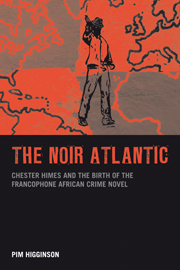Book contents
- Frontmatter
- Contents
- Acknowledgements
- Introduction: The Frivolous Literary
- 1 “Pas de littérature”: Abasse Ndione and the Rise of Crime
- 2 Minor Mistranslations: Simon Njami and the Making of a Parisianist Himes
- 3 Crime Pays: Achille Ngoye and the Série noire
- 4 Ethnographic Erotics: Bolya and the Writing of the Other
- 5 Terreur Rose: Kouty, mémoire de sang and the Gendering of Noir
- 6 Going out Blazing: Mongo Beti's Last Two Novels
- Bibliography
- Index
Introduction: The Frivolous Literary
- Frontmatter
- Contents
- Acknowledgements
- Introduction: The Frivolous Literary
- 1 “Pas de littérature”: Abasse Ndione and the Rise of Crime
- 2 Minor Mistranslations: Simon Njami and the Making of a Parisianist Himes
- 3 Crime Pays: Achille Ngoye and the Série noire
- 4 Ethnographic Erotics: Bolya and the Writing of the Other
- 5 Terreur Rose: Kouty, mémoire de sang and the Gendering of Noir
- 6 Going out Blazing: Mongo Beti's Last Two Novels
- Bibliography
- Index
Summary
Quand le monde a cessé d'être frivole, les polars le deviennent.
Jean-Patrick Manchette, ChroniquesIn 1984, Nouvelles Éditions africaines du Sénégal published an odd book about the marijuana smoking culture in and around Senegal's capital city, Dakar. Evocatively named La Vie en spirale, the book was written by a full-time nurse and part-time author named Abasse Ndione. The particular manner in which it engaged with the criminal milieu of a major African city turned out to be a significant event: it marked the appearance of noir in Francophone African letters. Ndione's novel would inaugurate a twenty-year trend among a distinct group of Francophone African authors who, during that period, were doing two important things: systematically turning away from a complex dialectical relationship to a French aesthetic model inherited from the colonial experience, and renegotiating their relationship to an anthropological-ideological imperative that had dominated Francophone African writing since at least the 1950s. The importance of this turn to noir in contemporary African letters would be consecrated in 2000 when Cameroonian Mongo Beti (1932–2001), one of the continent's most famous writers, chose to make his last work, Branle-bas en noir et blanc, explicitly noir.
Adapting a genre historically identified with the United States seemed to offer these authors a way around the overbearing French influence on Francophone African literary tradition. Still, had they limited themselves to this move, the effects might ironically have been blunted by the genre's historical framing: the term “noir” itself comes out of France and was applied to a specific school of American writing beginning with the “hard-boiled” crime novels of the 1920s and 1930s and to French authors writing in the same vein.
- Type
- Chapter
- Information
- The Noir AtlanticChester Himes and the Birth of the Francophone African Crime Novel, pp. 1 - 38Publisher: Liverpool University PressPrint publication year: 2011



